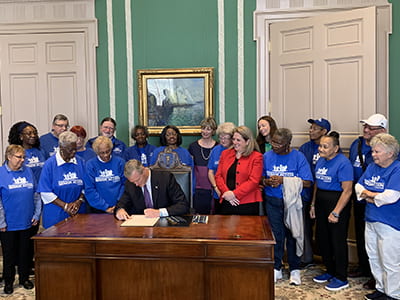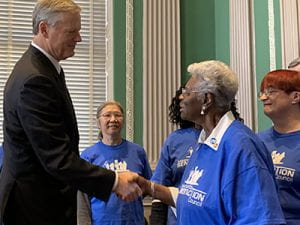 This article is one in a series of stories about how people across the country are using the Elder Index to understand the true cost of living for older adults and its economic implications. If you know someone who would like to receive information about these stories, send us a note at gerontologyinstitute@umb.edu.
This article is one in a series of stories about how people across the country are using the Elder Index to understand the true cost of living for older adults and its economic implications. If you know someone who would like to receive information about these stories, send us a note at gerontologyinstitute@umb.edu.
The cost of health care is one of the most common economic problems facing older adults across America. In more serious cases, it can lead to a bleak choice between paying for medicine or affording other basic needs.
These are familiar facts of elder life to the Massachusetts Senior Action Council, a grass roots organization focused on public policy and community issues affecting the health and well-being of older adults.
Research on policy options to address the problem led the council to focus on Medicare Savings Programs, which help qualified beneficiaries with health costs. Though the programs are run by the federal government, states have the ability to change eligibility standards for their older adults.
The council launched a campaign to make the Medicare Savings Programs available to more Massachusetts elders. It took years but finally paid off when Gov. Charlie Baker signed the state’s 2020 budget, which included a policy that now offers an estimated 40,000 older adults access to more than $150 million in new annual benefits.
A key resource in the successful effort: The University of Massachusetts Boston’s Elder Index, a free online tool that provides realistic and detailed cost of living data for older adults living in every U.S. state and county.
“The Elder Index was really critical on a couple of levels,” said Carolyn Villers, the council’s executive director. She explained that the index helped policymakers understand the economic challenges facing older adults in Massachusetts. It also helped many elders struggling with money see they were far from alone.

Gov. Charlie Baker was joined by members of the Massachusetts Senior Action Council when he signed legislation expanding access to Medicare Savings Programs for state residents.
The Elder Index calculates that the average single older adult in good health who rents a home in Massachusetts needs $2,807 per month to afford a no-frills budget. The cost for an elder couple living in the same circumstances amounts to $3,853 monthly.
Elder Index data, combined with income statistics, showed in 2019 that 61.7% of those single older renters in Massachusetts did not make enough to afford their basic cost of living – the highest rate in the nation. The economic insecurity rate for older couples living in the state, at 29.7 percent, was the country’s third-highest.
“That framing, in and of itself, has been really important,” said Villers. “There’s a perception that seniors are relatively wealthy in Massachusetts, when in reality the situation is much different.”
Convincing state government to change eligibility standards for the Medicare Savings Programs took six years. Early on, a proposal won the approval of a legislative committee but went no further. Later, a component of the plan was attached to another bill that died in a conference committee.
But by 2019, Baker got behind expansion of eligibility for MSPs and legislative language to make that happen was attached to state’s budget for the following year. The state redirected some existing spending to support elders and added $7 million more to gain access to much greater federal support.
A key element of the grassroots campaign to expand access to MSPs in Massachusetts involved council members who told their personal stories of financial struggle in statehouse hearings and elsewhere, becoming public faces and voices of elder economic insecurity.

Gov. Charlie Baker greets Sarah Blakeney, who saved more than $300 per month thanks to Medicare Savings Plans expansion.
Here, again, the Elder Index played an important role.
“Seniors and many who find it difficult to afford all their basic needs often are made to feel it’s their fault,” said Villers. “They didn’t work hard enough or save enough or didn’t have the right job. The reality was that even folks with limited incomes worked very hard and made every effort to save but it wasn’t enough.
“The index has been very helpful enabling seniors to put their lives in the context of the larger population. They were able to see, maybe it wasn’t their fault. For some, it helped them to feel more comfortable to share their experiences and their stories,” she said.
In 2020, the first year of expanded eligibility for MSPs in Massachusetts, about 10,000 older adults took advantage of the programs for the first time and another 10,000 received enhanced benefits. In total, those older adults were able to access an estimated $70 million in new benefits.
The council continues to work on a range of other policy issues surrounding elder economic security, from affordable public transportation, to affordable housing in individual communities, to expanded enrollment for SNAP benefits. The personal stories of council members are always a core element of the campaign strategy. So is the Elder Index.
“The index always allows us to create the bigger picture,” Villers said. “It’s important to have the data that will put those personal stories in context.”

Leave a Reply